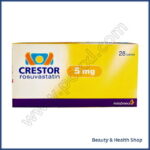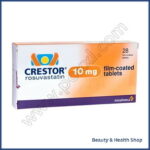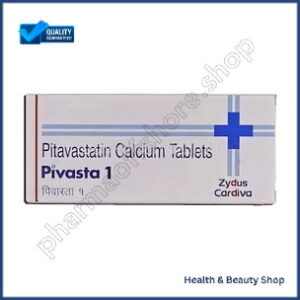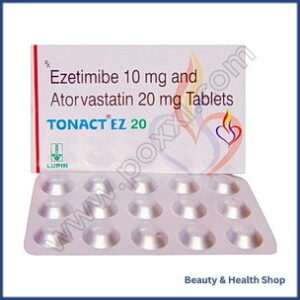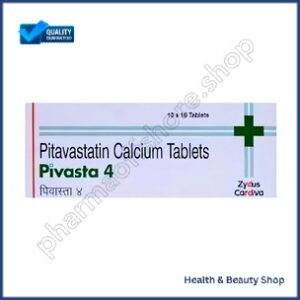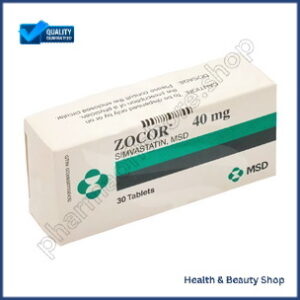ADDICTION
ALCOHOL DEPENDENCE
QUIT SMOKING
ALLERGY
ANTI FUNGAL
FUNGAL INFECTION
FUNGAL NAIL INFECTIONS
ANTI-REJECTION DRUGS
ANTI WORM
ANTIBIOTIC
BACTERIAL INFECTIONS
ARTHRITIS
GOUT
OSTEOARTHRITIS
RHEUMATOID ARTHRITIS
BLOOD
LOW PLATELET COUNT
THROMBOPHLEBITIS
VARICOSE VEINS
COLON
ANAL FISSURE
PILES
ULCERATIVE COLITIS
DIABETES CARE
DIABETES INSIPIDUS
DIABETES TYPE
DIABETIC FOOT ULCERS
GLUCOSE MONITOR
EYES/EAR CARE
DRY EYES
EYE CARE
EYE EXAMINATION
EYE INFECTION
EYE LASHES
EYE PAIN
GLAUCOMA
OCULAR HYPERTENSION
UVEITIS
FEVER CARE
MALARIA
RHEUMATIC FEVER
TYPHOID FEVER
GASTROINTESTINAL
ACIDITY
CONSTIPATION
CROHN'S DISEASE
DIARRHOEA
GALLBLADDER STONES
INTESTINAL ULCERS
IRRITABLE BOWEL SYNDROME
MOTION SICKNESS
NAUSEA
Crestor (Rosuvastatin)
Crestor 5 mg (Rosuvastatin)
Crestor 10 mg (Rosuvastatin)
Crestor 20 mg (Rosuvastatin)
Crestor 40 mg (Rosuvastatin)
| Active Ingredient (Generic Name): | Rosuvastatin |
|---|---|
| Indication: | High cholesterol |
| Manufacturer | AstraZeneca Pharma India Ltd |
| Packaging: | 10 tablets in one strip, 30 tablets in one strip |
From: $94.00
Crestor (Rosuvastatin) is a medication that plays an essential role in managing cholesterol levels, particularly LDL and HDL. Its ability to lower bad cholesterol while boosting good cholesterol is well-known. But, there’s more to this widely prescribed drug than just cholesterol management. It holds significant benefits beyond lipid control, with ongoing research shedding light on its diverse applications. Whether you’re already familiar with Crestor or just beginning to explore its potential, understanding its broader impact could be eye-opening.
Why is this medication prescribed?
When prescribed Crestor (Rosuvastatin), it aims to lower your cholesterol levels effectively. Crestor is a medication classified as a statin, which works by decreasing the production of cholesterol in your liver. By lowering the levels of “bad” cholesterol (LDL) and triglycerides in your blood, while increasing the levels of “good” cholesterol (HDL), Crestor helps reduce the risk of heart-related complications such as heart attacks, strokes, and other cardiovascular diseases. High cholesterol can lead to the buildup of plaque in your arteries, narrowing them and potentially causing blockages. Crestor helps to prevent this buildup, promoting better blood flow and overall heart health. It is typically prescribed to individuals with high cholesterol levels, especially those who may be at risk of developing heart disease. Remember to follow your healthcare provider’s instructions carefully and attend regular check-ups to monitor the effectiveness and safety of Crestor for your specific health needs.
How should this medicine be used?
To use Crestor (Rosuvastatin) effectively, follow the dosage instructions provided by your healthcare provider. Typically, Crestor is taken once daily, with or without food. It is important to take this medication at the same time each day to maintain consistent levels in your body. Swallow the tablet whole with a glass of water, and do not crush, chew, or break it. Your healthcare provider will determine the appropriate dosage based on your medical condition and response to treatment. It is vital to follow their instructions carefully and not to adjust the dosage without consulting them first. If you forget to take a dose, take it as soon as you remember. However, if it is almost time for your next dose, skip the missed dose and continue with your regular dosing schedule. Do not take a double dose to make up for a missed one. Keep track of your medication usage and refill it in advance to maintain uninterrupted treatment.
Other uses for this medicine
If your healthcare provider deems it necessary, Crestor (Rosuvastatin) may also be used for other medical conditions aside from managing cholesterol levels. One such use is in individuals with genetically high cholesterol levels who are at risk of cardiovascular events. Crestor can help reduce the risk of heart attacks, strokes, and other complications in these cases. Additionally, this medication may be prescribed to lower the levels of triglycerides in the blood, which are another type of fat that can contribute to heart disease.
In some situations, Crestor might be recommended for individuals with certain inflammatory conditions, such as rheumatoid arthritis, to help reduce inflammation and lower the risk of cardiovascular complications associated with these conditions. Moreover, research is ongoing to explore the potential benefits of Crestor in other medical conditions, such as Alzheimer’s disease and certain types of cancers. It is important to follow your healthcare provider’s guidance regarding the appropriate use of Crestor for these alternative purposes.
What special precautions should I follow?
Before taking Crestor (Rosuvastatin), make sure to regularly check your cholesterol levels as directed by your healthcare provider. It is essential to follow any dietary and exercise recommendations provided to you to maximize the effectiveness of the medication. Remember to inform your doctor about any other medications or supplements you are taking to avoid potential interactions.
Check Your Cholesterol Levels
Regularly monitoring your cholesterol levels is crucial for managing your health while taking Crestor (Rosuvastatin). To guarantee you are effectively monitoring your cholesterol levels, consider the following:
- Schedule Regular Check-Ups: Make sure to schedule regular appointments with your healthcare provider to monitor your cholesterol levels and discuss any concerns.
- Follow Fasting Guidelines: Before getting your cholesterol levels checked, adhere to the fasting guidelines provided by your healthcare provider for accurate results.
- Track Changes: Keep a record of your cholesterol levels over time to track any changes and discuss them with your healthcare provider during your appointments.
What special dietary instructions should I follow?
To maximize the effectiveness of Crestor (Rosuvastatin), make sure you maintain a balanced diet low in saturated fats and cholesterol. Consuming foods high in saturated fats and cholesterol can counteract the cholesterol-lowering benefits of Crestor. Incorporate plenty of fruits, vegetables, whole grains, and lean proteins into your meals. Opt for lean cuts of meat, skinless poultry, fish, and plant-based proteins like beans and legumes. Choose low-fat or fat-free dairy products to help reduce your saturated fat intake. Avoid trans fats often found in processed and fried foods. Instead, use healthier oils like olive oil for cooking. Be mindful of hidden sources of saturated fats in baked goods, snacks, and fast food. Reading food labels can help you identify high-fat and high-cholesterol items. By following these dietary guidelines, you can enhance the effectiveness of Crestor in managing your cholesterol levels.
What should I do if I forget a dose?
In case you forget to take a dose of Crestor (Rosuvastatin), promptly take it as soon as you remember, unless it is almost time for your next scheduled dose. If you realize you missed a dose close to the time for your next dose, skip the missed one and continue with your regular dosing schedule. Do not double up on doses to make up for the missed one. It is important to maintain a consistent intake of Crestor to effectively control your cholesterol levels. Missing a dose occasionally may not greatly impact the overall effectiveness of the medication, but try to adhere to your prescribed dosing regimen as closely as possible. Setting reminders or incorporating Crestor into your daily routine can help reduce the chances of forgetting a dose. If you have concerns about missed doses or are unsure about what to do, consult your healthcare provider for guidance on how to proceed.
What side effects can this medication cause?
When taking Crestor, it’s crucial to be vigilant about any persistent symptoms you may experience. Some side effects can be severe, so if you notice any of the following symptoms, contact your doctor promptly. Monitoring and reporting any concerning side effects promptly can help guarantee your well-being while using this medication.
Monitor for Persistent Symptoms
If you experience persistent symptoms while taking Crestor (Rosuvastatin), promptly report them to your healthcare provider. Some side effects of Crestor may necessitate medical attention to guarantee your well-being. When monitoring for persistent symptoms, be aware of the following:
- Muscle pain or weakness that does not improve with time or rest.
- Unexplained tenderness, swelling, or weakness in muscles.
- Dark-colored urine or yellowing of the skin or eyes.
Monitoring these symptoms closely and informing your healthcare provider promptly can help in managing any potential issues that may arise while taking Crestor.
Some side effects can be serious. If you experience any of the following symptoms, call your doctor immediately:
Be vigilant for any of the following symptoms that denote potentially serious side effects of Crestor (Rosuvastatin) and promptly contact your doctor if experienced. Some of the side effects that require immediate medical attention include:
- Unexplained muscle pain, tenderness, or weakness, as this could be a sign of a rare but serious muscle problem.
- Yellowing of the skin or eyes, dark urine, or persistent nausea/vomiting, which may indicate liver problems.
- Signs of an allergic reaction such as rash, itching, swelling, severe dizziness, or trouble breathing, as this requires urgent medical intervention.
It is essential to be aware of these symptoms and seek medical help promptly to address any potential serious side effects associated with Crestor.
What should I know about the storage and disposal of this medication?
Make sure to store Crestor (Rosuvastatin) at room temperature and keep it out of reach of children and pets. It is important to store this medication in its original container to protect it from light and moisture. Avoid storing Crestor in the bathroom or kitchen, where humidity levels can fluctuate. Keep the medication tightly closed when not in use. Do not freeze Crestor, and if it is exposed to extreme temperatures, such as high heat or cold, consider discarding it.
When it comes to disposing of Crestor, it is essential to do so properly. Do not flush this medication down the toilet unless instructed to do so. Instead, consult your pharmacist or local waste disposal company on how to safely dispose of Crestor. They can provide guidance on the appropriate way to discard unused or expired medication to prevent harm to others and the environment. Always follow the specific disposal instructions provided with the medication or as advised by your healthcare provider.
In case of an emergency/overdose
When it comes to Crestor (Rosuvastatin), understanding what to do in case of an emergency or overdose is vital for your safety and well-being. If you suspect an overdose or experience severe side effects such as muscle pain, weakness, abdominal pain, or difficulty breathing after taking Crestor, seek immediate medical help by calling emergency services or going to the nearest emergency room. It is essential to provide healthcare providers with information about the amount of Crestor ingested and any other medications you are taking to guarantee appropriate treatment.
In case of an emergency, do not attempt to induce vomiting unless instructed to do so by medical professionals. Additionally, avoid taking any medications, supplements, or substances to counteract the effects of Crestor without medical guidance. Emergency medical personnel will assess your condition and provide necessary interventions to manage the overdose effectively. Remember, quick action and seeking prompt medical attention can help prevent serious complications associated with Crestor overdose.
What other information should I know?
Understanding potential interactions with other medications is vital when taking Crestor (Rosuvastatin) to guarantee your safety and effectiveness of the treatment. It is essential to inform your healthcare provider about all the medications you are currently taking, including prescription, over-the-counter, vitamins, and herbal supplements. Some drugs, like certain antibiotics or antifungal medications, can interact with Crestor and affect its efficacy. Additionally, grapefruit and grapefruit juice should be avoided while on Crestor as they can increase the levels of the medication in your bloodstream, leading to potential side effects. Alcohol consumption should also be moderated as it can elevate triglyceride levels and interfere with the medication’s effectiveness.
Regular monitoring of your cholesterol levels and liver function tests is necessary during Crestor treatment to ensure it is working effectively and not causing any harm. Make sure to follow your healthcare provider’s instructions closely and attend all scheduled appointments to track your progress and address any concerns promptly. Lastly, maintaining a healthy lifestyle through proper diet, exercise, and smoking cessation is essential for maximizing the benefits of Crestor treatment.
Brand names
As you explore the world of cholesterol-lowering medications like Crestor (Rosuvastatin), you may encounter this drug under various brand names. Different pharmaceutical companies may market rosuvastatin under different names. Below is a table detailing some common brand names of rosuvastatin:
| Brand Name | Manufacturer |
|---|---|
| Crestor | AstraZeneca |
| Ezallor | Dr. Reddy’s Labs |
| Rosuvastatin | Various Generic Manufacturers |
| Rosulip | Cipla |
| Simestat | Micro Labs |
These brand names refer to the same active ingredient, rosuvastatin, but are marketed under different names by various companies. It is vital to make sure you are getting the correct medication regardless of the brand name. Always consult your healthcare provider or pharmacist if you have any questions or concerns about the brand of rosuvastatin you are prescribed.
Purchase From Authorized Pharmacies
To guarantee the authenticity and quality of the cholesterol-lowering medication, always purchase rosuvastatin from authorized pharmacies. Authorized pharmacies are licensed establishments that have met specific standards set by regulatory bodies to secure the safety and efficacy of the medications they dispense. When you buy Crestor (rosuvastatin) from authorized pharmacies, you can trust that you are getting the genuine product, reducing the risk of counterfeit or substandard medications.
Authorized pharmacies source their medications directly from reputable manufacturers, which helps prevent the distribution of fake or adulterated drugs. By purchasing rosuvastatin from these pharmacies, you can have peace of mind knowing that the medication you are taking is the correct formulation and dosage as prescribed by your healthcare provider.
Furthermore, authorized pharmacies have trained pharmacists who can provide you with accurate information about rosuvastatin, including proper usage, potential side effects, and drug interactions. This guidance can help you take the medication safely and effectively to manage your cholesterol levels. Remember, when it comes to your health, always choose to purchase rosuvastatin from authorized pharmacies.
To summarise
For a concise overview, consider this summary. When it comes to Crestor (Rosuvastatin), it is a medication primarily used to lower cholesterol levels in the body. By inhibiting an enzyme in the liver, Crestor helps reduce the production of cholesterol, thereby decreasing the risk of heart disease and stroke. It is important to take Crestor as directed by your healthcare provider, usually once daily, with or without food. It is essential to follow a healthy diet and exercise regimen while taking Crestor to maximize its effectiveness.
Common side effects of Crestor may include muscle pain, weakness, and stomach issues, but serious side effects like liver problems are rare. It is important to notify your doctor immediately if you experience any unusual symptoms while taking Crestor. Additionally, Crestor may interact with other medications, so it is important to inform your healthcare provider about all the medications you are currently taking.



